暑假打卡计划】2025年七年级英语下册复习第3讲Unit9(含答案解析)(最新仁爱版)
文档属性
| 名称 | 暑假打卡计划】2025年七年级英语下册复习第3讲Unit9(含答案解析)(最新仁爱版) |
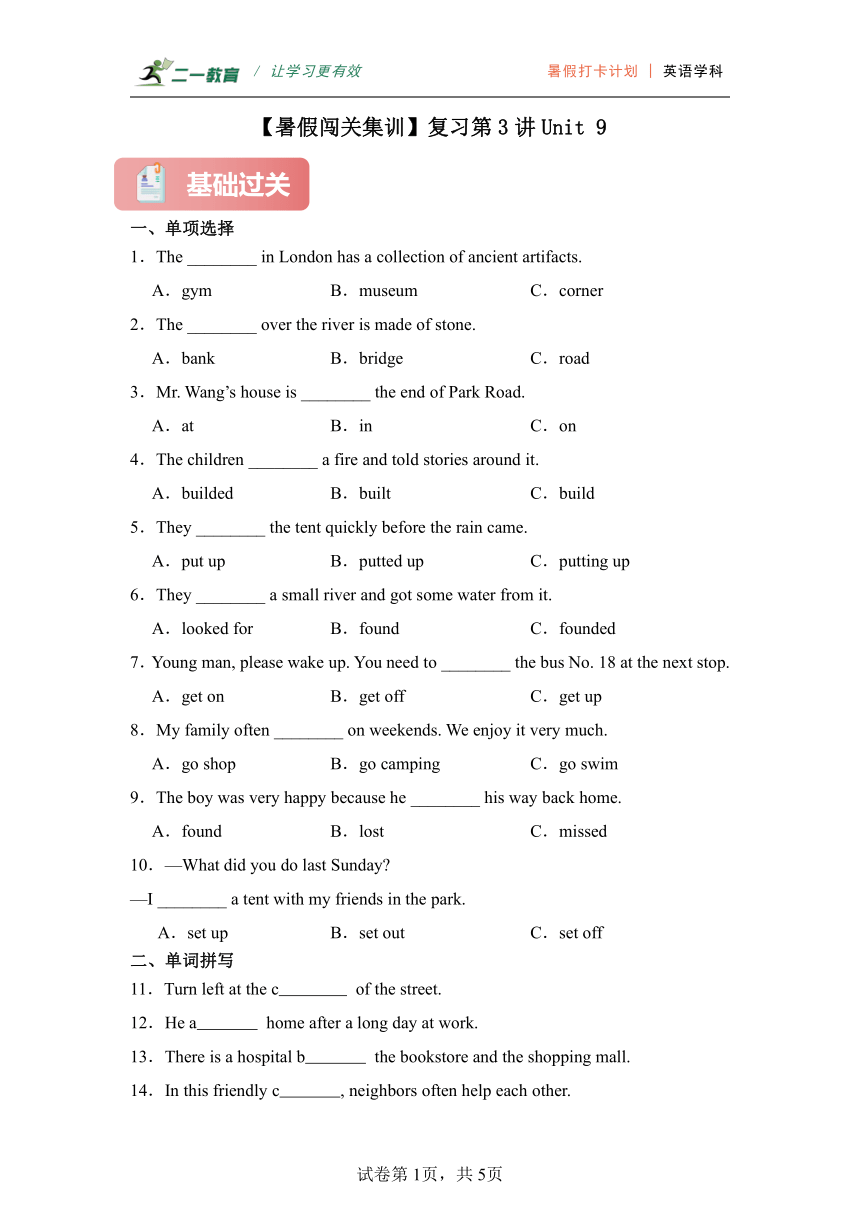
|
|
| 格式 | docx | ||
| 文件大小 | 75.5KB | ||
| 资源类型 | 试卷 | ||
| 版本资源 | 仁爱科普版 | ||
| 科目 | 英语 | ||
| 更新时间 | 2025-06-27 10:12:03 | ||
图片预览

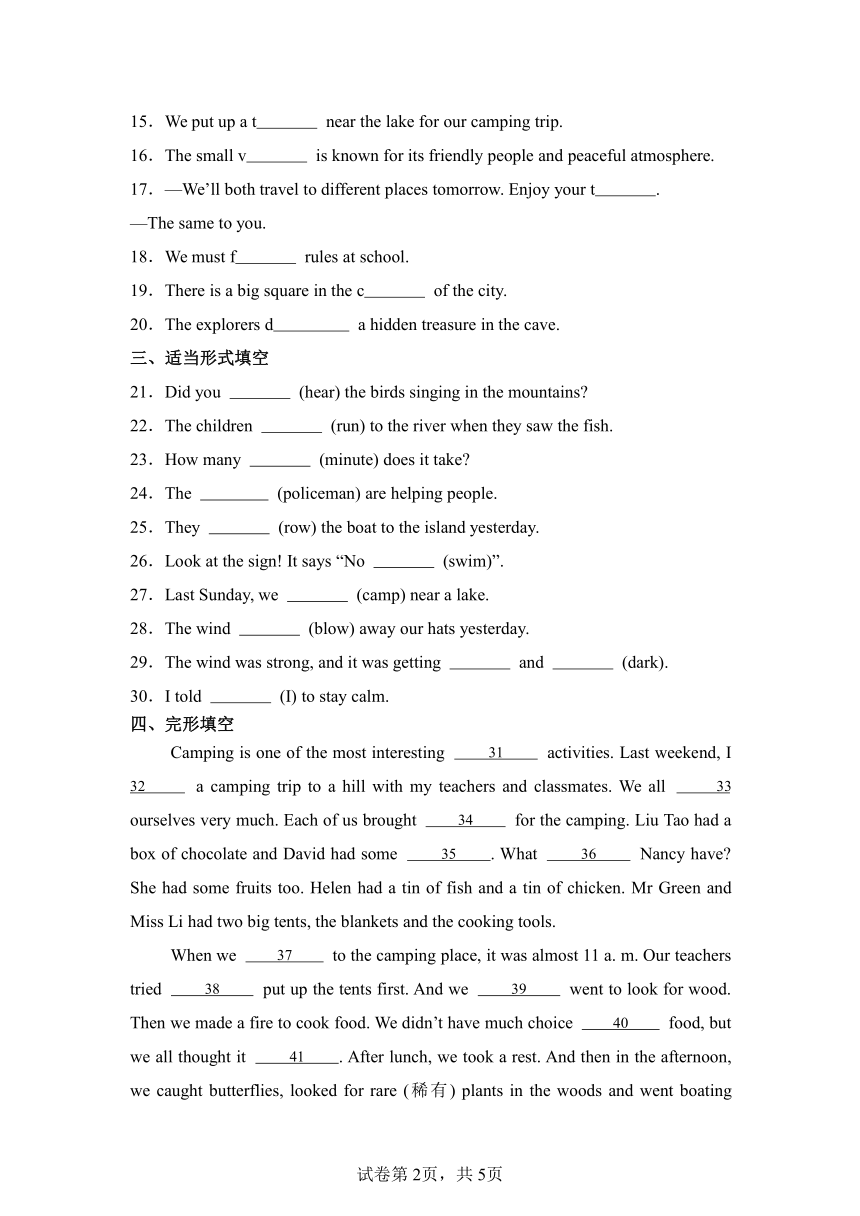
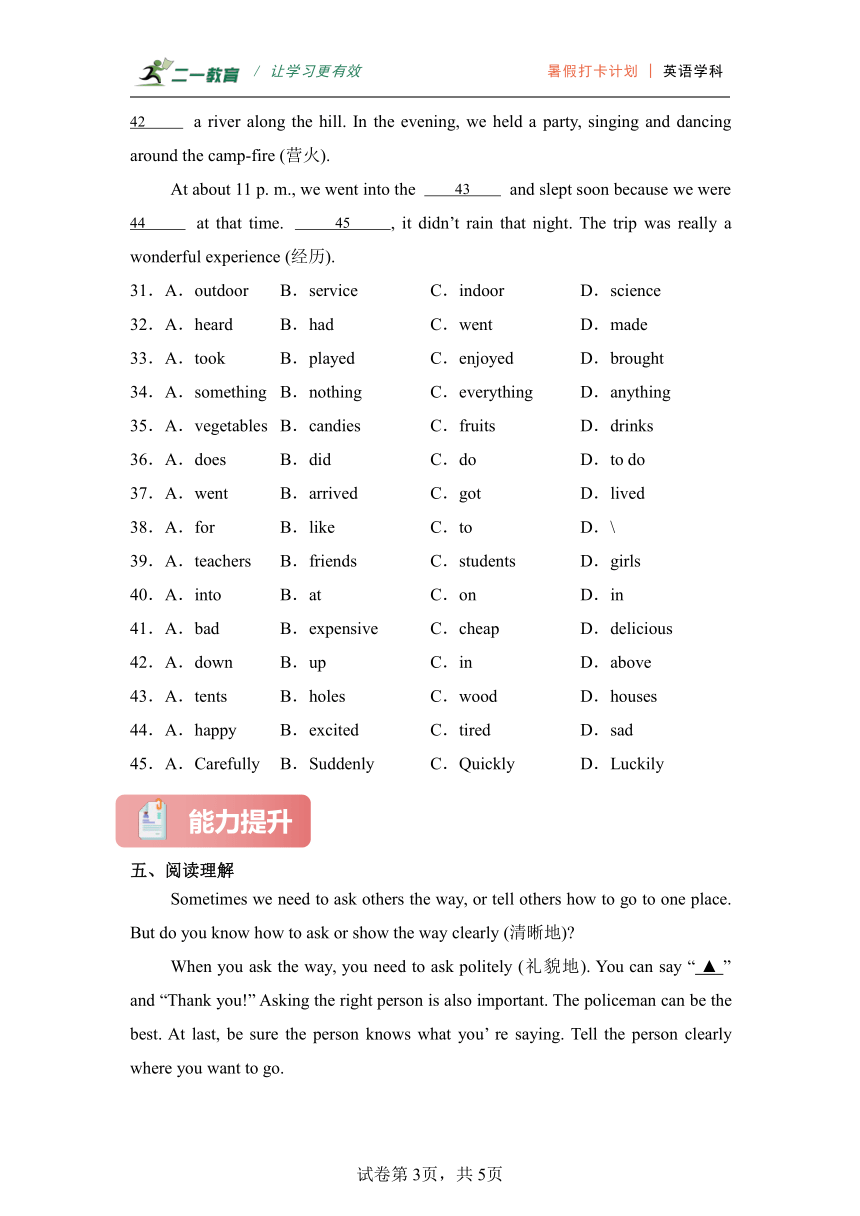
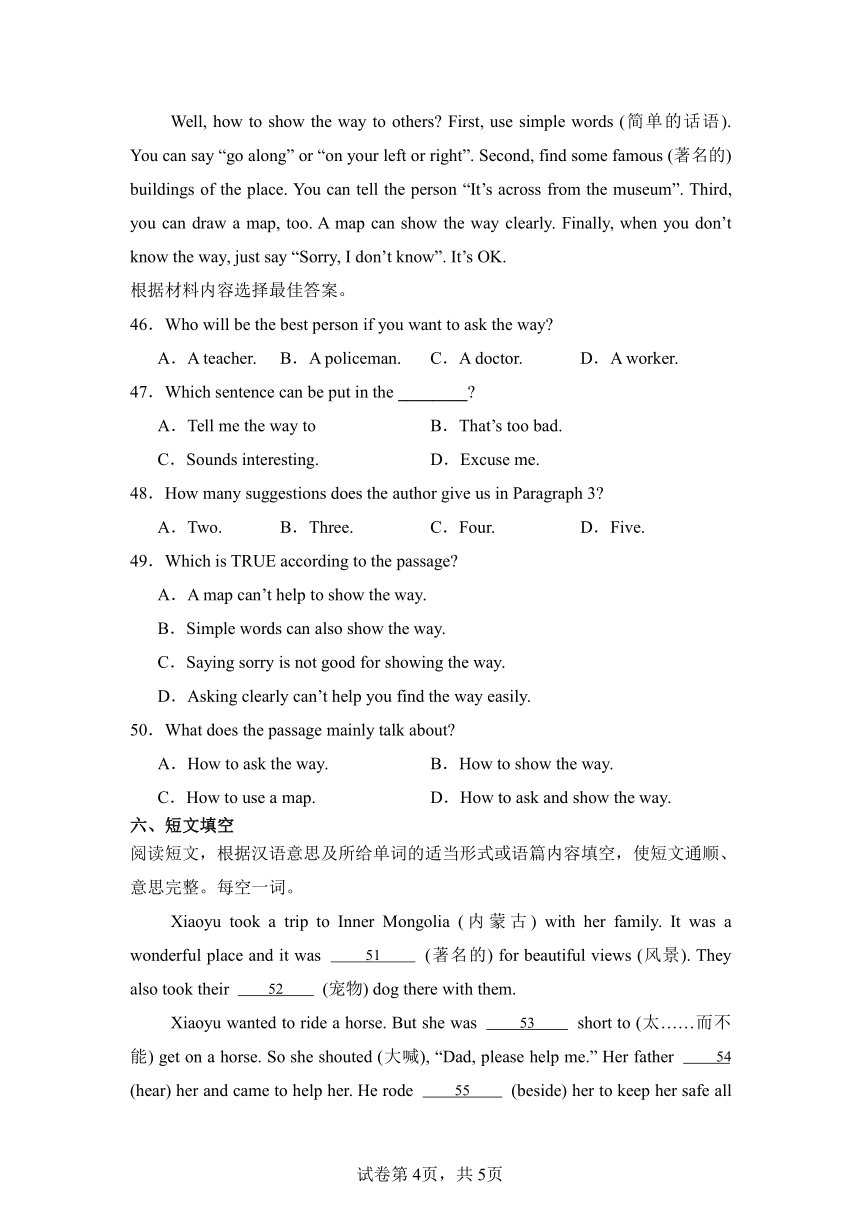
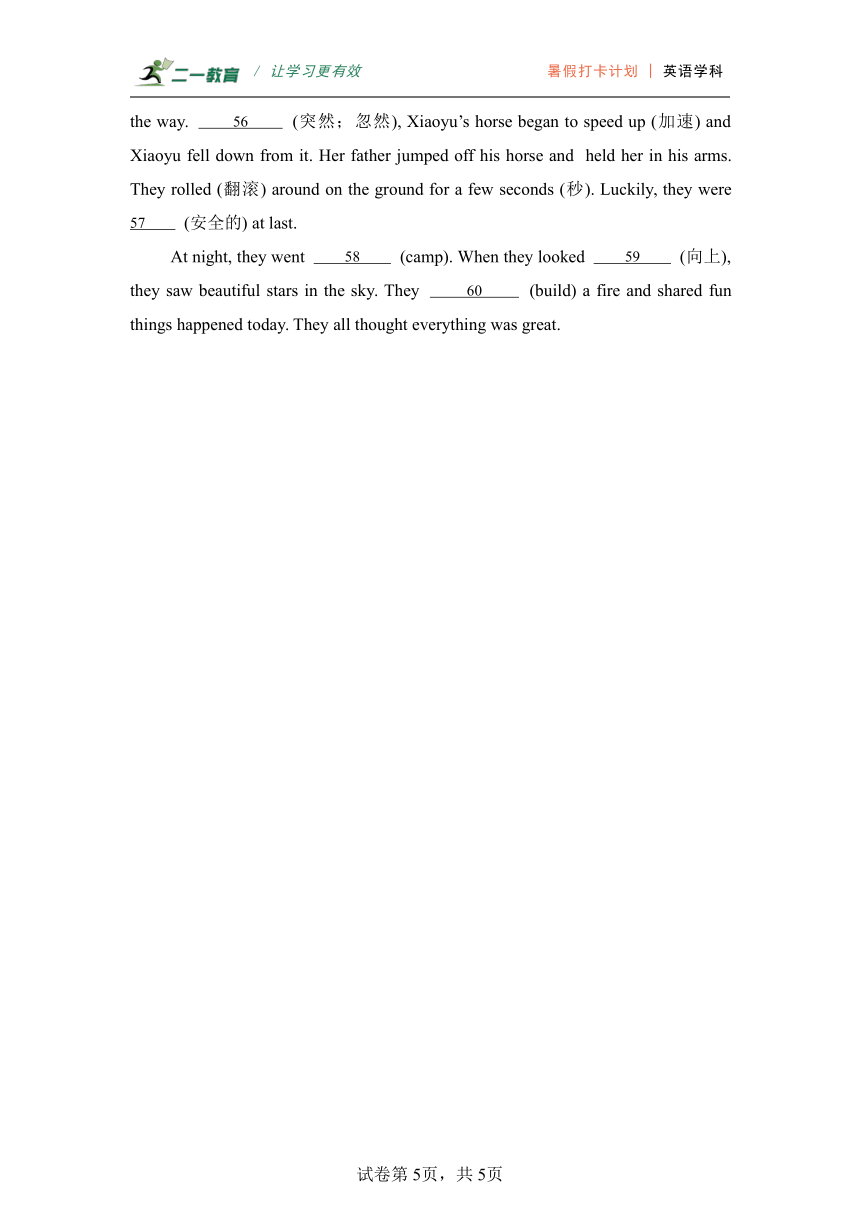
文档简介
【暑假闯关集训】复习第3讲Unit 9
一、单项选择
1.The ________ in London has a collection of ancient artifacts.
A.gym B.museum C.corner
2.The ________ over the river is made of stone.
A.bank B.bridge C.road
3.Mr. Wang’s house is ________ the end of Park Road.
A.at B.in C.on
4.The children ________ a fire and told stories around it.
A.builded B.built C.build
5.They ________ the tent quickly before the rain came.
A.put up B.putted up C.putting up
6.They ________ a small river and got some water from it.
A.looked for B.found C.founded
7.Young man, please wake up. You need to ________ the bus No. 18 at the next stop.
A.get on B.get off C.get up
8.My family often ________ on weekends. We enjoy it very much.
A.go shop B.go camping C.go swim
9.The boy was very happy because he ________ his way back home.
A.found B.lost C.missed
10.—What did you do last Sunday
—I ________ a tent with my friends in the park.
A.set up B.set out C.set off
二、单词拼写
11.Turn left at the c of the street.
12.He a home after a long day at work.
13.There is a hospital b the bookstore and the shopping mall.
14.In this friendly c , neighbors often help each other.
15.We put up a t near the lake for our camping trip.
16.The small v is known for its friendly people and peaceful atmosphere.
17.—We’ll both travel to different places tomorrow. Enjoy your t .
—The same to you.
18.We must f rules at school.
19.There is a big square in the c of the city.
20.The explorers d a hidden treasure in the cave.
三、适当形式填空
21.Did you (hear) the birds singing in the mountains
22.The children (run) to the river when they saw the fish.
23.How many (minute) does it take
24.The (policeman) are helping people.
25.They (row) the boat to the island yesterday.
26.Look at the sign! It says “No (swim)”.
27.Last Sunday, we (camp) near a lake.
28.The wind (blow) away our hats yesterday.
29.The wind was strong, and it was getting and (dark).
30.I told (I) to stay calm.
四、完形填空
Camping is one of the most interesting 31 activities. Last weekend, I 32 a camping trip to a hill with my teachers and classmates. We all 33 ourselves very much. Each of us brought 34 for the camping. Liu Tao had a box of chocolate and David had some 35 . What 36 Nancy have She had some fruits too. Helen had a tin of fish and a tin of chicken. Mr Green and Miss Li had two big tents, the blankets and the cooking tools.
When we 37 to the camping place, it was almost 11 a. m. Our teachers tried 38 put up the tents first. And we 39 went to look for wood. Then we made a fire to cook food. We didn’t have much choice 40 food, but we all thought it 41 . After lunch, we took a rest. And then in the afternoon, we caught butterflies, looked for rare (稀有) plants in the woods and went boating 42 a river along the hill. In the evening, we held a party, singing and dancing around the camp-fire (营火).
At about 11 p. m., we went into the 43 and slept soon because we were 44 at that time. 45 , it didn’t rain that night. The trip was really a wonderful experience (经历).
31.A.outdoor B.service C.indoor D.science
32.A.heard B.had C.went D.made
33.A.took B.played C.enjoyed D.brought
34.A.something B.nothing C.everything D.anything
35.A.vegetables B.candies C.fruits D.drinks
36.A.does B.did C.do D.to do
37.A.went B.arrived C.got D.lived
38.A.for B.like C.to D.\
39.A.teachers B.friends C.students D.girls
40.A.into B.at C.on D.in
41.A.bad B.expensive C.cheap D.delicious
42.A.down B.up C.in D.above
43.A.tents B.holes C.wood D.houses
44.A.happy B.excited C.tired D.sad
45.A.Carefully B.Suddenly C.Quickly D.Luckily
五、阅读理解
Sometimes we need to ask others the way, or tell others how to go to one place. But do you know how to ask or show the way clearly (清晰地)
When you ask the way, you need to ask politely (礼貌地). You can say “ ▲ ” and “Thank you!” Asking the right person is also important. The policeman can be the best. At last, be sure the person knows what you’ re saying. Tell the person clearly where you want to go.
Well, how to show the way to others First, use simple words (简单的话语). You can say “go along” or “on your left or right”. Second, find some famous (著名的) buildings of the place. You can tell the person “It’s across from the museum”. Third, you can draw a map, too. A map can show the way clearly. Finally, when you don’t know the way, just say “Sorry, I don’t know”. It’s OK.
根据材料内容选择最佳答案。
46.Who will be the best person if you want to ask the way
A.A teacher. B.A policeman. C.A doctor. D.A worker.
47.Which sentence can be put in the ________
A.Tell me the way to B.That’s too bad.
C.Sounds interesting. D.Excuse me.
48.How many suggestions does the author give us in Paragraph 3
A.Two. B.Three. C.Four. D.Five.
49.Which is TRUE according to the passage
A.A map can’t help to show the way.
B.Simple words can also show the way.
C.Saying sorry is not good for showing the way.
D.Asking clearly can’t help you find the way easily.
50.What does the passage mainly talk about
A.How to ask the way. B.How to show the way.
C.How to use a map. D.How to ask and show the way.
六、短文填空
阅读短文,根据汉语意思及所给单词的适当形式或语篇内容填空,使短文通顺、意思完整。每空一词。
Xiaoyu took a trip to Inner Mongolia (内蒙古) with her family. It was a wonderful place and it was 51 (著名的) for beautiful views (风景). They also took their 52 (宠物) dog there with them.
Xiaoyu wanted to ride a horse. But she was 53 short to (太……而不能) get on a horse. So she shouted (大喊), “Dad, please help me.” Her father 54 (hear) her and came to help her. He rode 55 (beside) her to keep her safe all the way. 56 (突然;忽然), Xiaoyu’s horse began to speed up (加速) and Xiaoyu fell down from it. Her father jumped off his horse and held her in his arms. They rolled (翻滚) around on the ground for a few seconds (秒). Luckily, they were 57 (安全的) at last.
At night, they went 58 (camp). When they looked 59 (向上), they saw beautiful stars in the sky. They 60 (build) a fire and shared fun things happened today. They all thought everything was great.
/ 让学习更有效 暑假打卡计划 | 英语学科
试卷第1页,共3页
试卷第1页,共3页
参考答案
1.B
【详解】在伦敦的博物馆收藏了很多古代文物。
考查名词辨析。gym体育馆;museum博物馆;corner角落。根据“a collection of ancient artifacts”可知,此处指博物馆收藏了很多古代文物。故选B。
2.B
【详解】句意:河上的桥是石头做的。
考查名词辨析。bank银行;bridge桥;road路。根据“over the river is made of stone”可知,此处指的是河上的“桥”,故选B。
3.A
【详解】句意:王先生的房子在公园路的尽头。
考查介词辨析。at在;in在……里;on在……上。根据空后“the end of Park Road”可知,此处是指在公园路的尽头;考查at the end of…“在……的尽头”,介词短语。故选A。
4.B
【详解】句意:孩子们生了一堆火,围着它讲故事。
考查动词时态。根据“a fire and told stories around it.”可知,句子描述的是过去发生的事,动词需用过去式built。故选B。
5.A
【详解】句意:他们在下雨之前迅速搭起了帐篷。
考查动词时态。根据“the tent quickly before the rain came”可知,该句时态是一般过去时,谓语动词用过去式,put up“搭起”,put的过去式为put。故选A。
6.B
【详解】句意:他们找到了一条小河并从那里取了些水。
考查动词辨析。looked for寻找;found找到,是find过去式;founded建立,是found的过去式。根据“a small river and got some water from it”可知,是指找到了一条小溪,强调结果,用found。故选B。
7.B
【详解】句意:年轻人,醒醒。你需要在下一站下18路公交车。
考查动词短语辨析。 get on上车;get off下车;get up起床。根据“Young man, please wake up. You need to...the bus No. 18 at the next stop.”可知,此处表达提醒年轻人在下一站下车,get off“下车”符合句意。故选B。
8.B
【详解】句意:我的家人经常在周末去野营。我们非常喜欢它。
考查动词短语辨析。go shop错误搭配;go camping去野营;go swim错误搭配。根据语境“We enjoy it very much.”可知,这里it代指的是上句话中提到的事情,结合选项,应该是去野营这件事让我们非常喜欢,故选B。
9.A
【详解】句意:这个男孩很开心,因为他找到了回家的路。
考查动词词义辨析。found找到;lost丢失;missed错过。根据“The boy was very happy...”可知,这个男孩高兴的原因应是找到了回家的路,found his way back home“找到他回家的路”符合句意。故选A。
10.A
【详解】句意:——你上周日做什么了?——我和朋友们在公园搭了个帐篷。
考查动词短语辨析。set up搭建,建立;set out出发,开始;set off出发,动身。set up a tent为常用搭配,意思是“搭帐篷”,符合题意。故选A。
11.(c)orner
【详解】句意:在街道的拐角处左转。根据“Turn left at the...of the street”及首字母c可知,corner“拐角;角落”符合语境,at the corner of 表示“在……的拐角处”,故填(c)orner。
12.(a)rrived
【详解】句意:他结束了一天的工作,回到家中。根据“He...home after a long day at work.”并结合首字母r可知,这里表示“他工作了一整天后回到家”,arrive意为“到达”,动词;结合语境可知用一般过去时,故填(a)rrived。
13.(b)etween
【详解】句意:书店和购物中心之间有一家医院。根据“the bookstore and the shopping mall”及首字母提示可知,此处表示在书店和购物中心之间,between“在……之间”,介词。故填(b)etween。
14.(c)ommunity
【详解】句意:在这个友好的社区里,邻居们经常互相帮助。根据“neighbors often help each other”可知,这里描述的是社区里邻里关系很友好,community“社区”,this修饰名词单数,故填(c)ommunity。
15.(t)ent
【详解】句意:我们在湖边搭了一个帐篷露营。空处位于a后,填可数名词单数作宾语。根据“for our camping trip”和首字母提示可知,露营会搭帐篷。tent“帐篷”,可数名词。故填(t)ent。
16.(v)illage
【详解】句意:这个小村庄以其友好的人民和宁静的气氛而闻名。根据“its friendly people and peaceful atmosphere”可知,小村庄里面有友好的人民和宁静的气氛,village“村庄”,根据is可知,此空应填单数名词,故填(v)illage。
17.(t)rip
【详解】句意:——我们明天要去不同的地方旅行。祝你旅途愉快。——你也一样。根据“We’ll both travel to different places tomorrow”可知,是出去旅行。结合首字母t可知,应用名词trip。故填(t)rip。
18.(f)ollow
【详解】句意:我们在学校必须遵守规则。根据“We must...rules”及首字母提示可知,这里指遵守规则,follow意为“遵守”,情态动词后跟动词原形,故填(f)ollow。
19.(c)enter/(c)entre
【详解】句意:在城市的中心有一个大广场。根据“in the...of the city”和首字母可知,此处使用center/centre“中心”,名词,作介词of的宾语,表示广场的地理位置。故填(c)enter/(c)entre。
20.(d)iscovered
【详解】句意:探险者们在洞穴中发现了一处隐藏的宝藏。分析句子结构可知,主语是The explorers,需要填入一个动词来作谓语。结合语境,探险者们在洞穴中“发现”了宝藏,因此动词应为“discover发现”。陈述过去的事实使用一般过去时态。故填(d)iscovered。
21.hear
【详解】句意:你听到小鸟在山里唱歌吗?助动词did后面接动词原形,hear“听见”,动词。故填hear。
22.ran
【详解】句意:当孩子们看见鱼时,他们跑向了河边。根据“when they saw the fish.”可知,该句时态为一般过去时,表示孩子们跑向了河边,run的过去式为ran。故填ran。
23.minutes
【详解】句意:需要花多长时间?minute“分钟”为名词,how many后可数名词复数,故填minutes。
24.policemen
【详解】句意:警察正在帮助人们。根据“are”可知,主语需为名词复数形式。policeman“警察”的复数形式为policemen。故填policemen。
25.rowed
【详解】句意:他们昨天划船到了这个岛。分析句子成分可知,空处缺谓语动词,根据“yesterday”可知,本句时态为一般过去时,谓语动词用过去式。故填rowed。
26.swimming
【详解】句意:看这个标志!上面写着“禁止游泳”。根据英文句子及提示词可知,“no doing sth.”意为“禁止做某事”;swim“游泳”,动词,动名词为swimming。故填swimming。
27.camped
【详解】句意:上周日,我们在湖边露营。根据句中“Last Sunday”可知,句子描述上周日的事情,时态为一般过去时,动词需要用过去式。故填camped。
28.blew
【详解】句意:昨天风把我们的帽子吹走了。blow“吹”,根据“yesterday”可知,该句是一般过去时,动词使用过去式。故填blew。
29. darker darker
【详解】句意:风很大,天色变得越来越暗。dark黑暗的,这里是“比较级+and+比较级”结构,dark的比较级是darker。故填darker;darker。
30.myself
【详解】句意:我告诉自己要保持冷静。句子主语为 I,此处人称代词主格I应变为反身代词myself,意为 “我自己”,作宾语,符合句意。故填myself。
31.A 32.B 33.C 34.A 35.C 36.B 37.C 38.C 39.C 40.C 41.D 42.C 43.A 44.C 45.D
【导语】本文讲述作者与师生的一次露营经历,包括准备物品、搭建帐篷、野炊及夜间活动,最后表达对这次美好体验的喜爱。
31.句意:露营是最有趣的户外活动之一。
outdoor户外;service服务;indoor室内;science科学。根据“Camping”及常识可知,露营应是一项户外活动。故选A。
32.句意:上周末,我和老师和同学们去了一座山里露营。
heard听到;had有;went去;made制作。had a trip“去旅行”,是固定搭配。故选B。
33.句意:我们都玩得很开心。
took带走;played玩耍;enjoyed享受;brought带来。根据下文“The trip was really a wonderful experience (经历).”可知,这次旅行真是一次美妙的经历,应是大家都玩得很开心,enjoyed oneself“玩得很开心”,是固定搭配。故选C。
34.句意:我们每个人都带了一些露营用品。
something某物;nothing没有什么;everything一切;anything任何事物。根据下文“Liu Tao had a box of chocolate…Helen had a tin of fish and a tin of chicken. Mr Green and Miss Li had two big tents, the blankets and the cooking tools”可知,每个人都带了一些露营用品。故选A。
35.句意:刘涛带了一盒巧克力,大卫带了一些水果。
vegetables蔬菜;candies糖果;fruits水果;drinks饮料。根据下文“She had some fruits too.”可知,大卫带了一些水果。故选C。
36.句意:南希带了什么?
does三单形式;did过去式;do动词原形;to do不定式。此处指过去的事情,应用一般过去时。故选B。
37.句意:当我们到达露营地时,已经快上午11点了。
went去;arrived到达;got到达;lived居住。get to“到达”,是固定搭配。故选C。
38.句意:我们的老师尽力先搭起帐篷。
for为了;like喜欢;to不定式符号;\不填。try to do“尽力做某事”,是固定搭配。故选C。
39.句意:我们学生去寻找木材。
teachers老师;friends朋友;students学生;girls女孩。根据上文“I …a camping trip to a hill with my teachers and classmates.”以及“Our teachers tried…put up the tents first.”可知,此处指学生们从事的事情。故选C。
40.句意:我们在食物上没有太多选择,但我们都认为它很美味。
into进入;at在;on在……上;in在……里面。have a choice on“有选择”,是固定搭配。故选C。
41.句意:我们在食物上没有太多选择,但我们都认为它很美味。
bad难吃的;expensive昂贵的;cheap便宜的;delicious美味的。根据“We didn’t have much choice…food, but we all thought it…”的语境可知,此处句意发生了转折,此处表示积极的含义,指认为食物很美味。故选D。
42.句意:然后在下午,我们捕捉蝴蝶,在树林里寻找稀有植物,沿着山在河里划船。
down向下;up向上;in在……里面;above在……上面。根据“went boating…a river along the hill”的语境可知,此处指在河里划船,in the river“在河里”符合。故选C。
43.句意:晚上11点左右,我们走进帐篷,很快就睡着了,因为当时我们很累。
tents帐篷;holes洞;wood木头;houses房子。根据上文“Our teachers tried…put up the tents first.”可知,此处指在帐篷里睡觉。故选A。
44.句意:晚上11点左右,我们走进帐篷,很快就睡着了,因为当时我们很累。
happy开心的;excited兴奋的;tired疲倦的;sad悲伤的。根据“slept soon”可知,很快就睡着了,应是累了。故选C。
45.句意:幸运的是,那天晚上没有下雨。
Carefully小心地;Suddenly突然;Quickly迅速地;Luckily幸运地。根据“it didn’t rain that night”可知,晚上没有下雨,应是一件幸运的事情。故选D。
46.B 47.D 48.C 49.B 50.D
【导语】本文主要介绍了问路和指路的相关方法与注意事项。
46.细节理解题。根据“When you ask the way, you need to ask politely. You can say... Asking the right person is also important. The policeman can be the best.”可知,在问路时,警察是最佳的询问对象。故选B。
47.推理判断题。根据“When you ask the way, you need to ask politely (礼貌地)”可知,问路需要礼貌,“Excuse me.”(打扰一下)是常用的礼貌用语。故选D。
48.细节理解题。根据“Well, how to show the way to others First, use simple words (简单的话语). You can say ‘go along’ or ‘on your left or right’. Second, find some famous (著名的) buildings of the place. You can tell the person ‘It’s across from the museum’. Third, you can draw a map, too. A map can show the way clearly. Finally, when you don’t know the way, just say ‘Sorry, I don’t know’. It’s OK.”可知,这里分别从“First”(首先)、“Second”(其次)、“Third”(第三)、“Finally”(最后)给出了四条建议。故选C。
49.细节理解题。根据“First, use simple words (简单的话语). You can say ‘go along’ or ‘on your left or right’.”可知,简单的话语可以用来指路。故选B。
50.主旨大意题。文章第一段提出“Sometimes we need to ask others the way, or tell others how to go to one place. But do you know how to ask or show the way clearly ”,接着第二段讲了问路的方法,第三段讲了指路的方法,所以文章主要谈论的是如何问路和指路。故选D。
51.famous 52.pet 53.too 54.heard 55.beside 56.Suddenly 57.safe 58.camping 59.up 60.built
【导语】本文主要讲述了小雨和家人去内蒙古旅行的经历。
51.句意:这是一个美妙的地方,它以美丽的景色而闻名。著名的:famous,形容词表语。故填famous。
52.句意:他们还带着他们的宠物狗去了那里。宠物:pet,名词作定语。故填pet。
53.句意:但是她太矮了,不能骑马。太……而不能:too…to,固定词组。故填too。
54.句意:她的父亲听到了她的声音,过来帮助她。根据“came”可知,句子时态是一般过去时,此处用动词过去式heard,意为“听到”。故填heard。
55.句意:他一路骑在她身边保护她的安全。beside意为“在……旁边“,介词。故填beside。
56.句意:突然,小雨的马开始加速,小雨从马上摔了下来。突然:Suddenly,副词修饰一整句话。故填Suddenly。
57.句意:幸运的是,他们终于安全了。安全的:safe,形容词作表语。故填safe。
58.句意:晚上,他们去露营。go camping意为“去露营”,动词短语。故填camping。
59.句意:当他们抬头看时,他们看到天空中美丽的星星。向上:up,副词。故填up。
60.句意:他们生了一堆火,分享今天发生的趣事。句子时态是一般过去时,此处用动词过去式built。故填built。
答案第1页,共2页
答案第1页,共2页
一、单项选择
1.The ________ in London has a collection of ancient artifacts.
A.gym B.museum C.corner
2.The ________ over the river is made of stone.
A.bank B.bridge C.road
3.Mr. Wang’s house is ________ the end of Park Road.
A.at B.in C.on
4.The children ________ a fire and told stories around it.
A.builded B.built C.build
5.They ________ the tent quickly before the rain came.
A.put up B.putted up C.putting up
6.They ________ a small river and got some water from it.
A.looked for B.found C.founded
7.Young man, please wake up. You need to ________ the bus No. 18 at the next stop.
A.get on B.get off C.get up
8.My family often ________ on weekends. We enjoy it very much.
A.go shop B.go camping C.go swim
9.The boy was very happy because he ________ his way back home.
A.found B.lost C.missed
10.—What did you do last Sunday
—I ________ a tent with my friends in the park.
A.set up B.set out C.set off
二、单词拼写
11.Turn left at the c of the street.
12.He a home after a long day at work.
13.There is a hospital b the bookstore and the shopping mall.
14.In this friendly c , neighbors often help each other.
15.We put up a t near the lake for our camping trip.
16.The small v is known for its friendly people and peaceful atmosphere.
17.—We’ll both travel to different places tomorrow. Enjoy your t .
—The same to you.
18.We must f rules at school.
19.There is a big square in the c of the city.
20.The explorers d a hidden treasure in the cave.
三、适当形式填空
21.Did you (hear) the birds singing in the mountains
22.The children (run) to the river when they saw the fish.
23.How many (minute) does it take
24.The (policeman) are helping people.
25.They (row) the boat to the island yesterday.
26.Look at the sign! It says “No (swim)”.
27.Last Sunday, we (camp) near a lake.
28.The wind (blow) away our hats yesterday.
29.The wind was strong, and it was getting and (dark).
30.I told (I) to stay calm.
四、完形填空
Camping is one of the most interesting 31 activities. Last weekend, I 32 a camping trip to a hill with my teachers and classmates. We all 33 ourselves very much. Each of us brought 34 for the camping. Liu Tao had a box of chocolate and David had some 35 . What 36 Nancy have She had some fruits too. Helen had a tin of fish and a tin of chicken. Mr Green and Miss Li had two big tents, the blankets and the cooking tools.
When we 37 to the camping place, it was almost 11 a. m. Our teachers tried 38 put up the tents first. And we 39 went to look for wood. Then we made a fire to cook food. We didn’t have much choice 40 food, but we all thought it 41 . After lunch, we took a rest. And then in the afternoon, we caught butterflies, looked for rare (稀有) plants in the woods and went boating 42 a river along the hill. In the evening, we held a party, singing and dancing around the camp-fire (营火).
At about 11 p. m., we went into the 43 and slept soon because we were 44 at that time. 45 , it didn’t rain that night. The trip was really a wonderful experience (经历).
31.A.outdoor B.service C.indoor D.science
32.A.heard B.had C.went D.made
33.A.took B.played C.enjoyed D.brought
34.A.something B.nothing C.everything D.anything
35.A.vegetables B.candies C.fruits D.drinks
36.A.does B.did C.do D.to do
37.A.went B.arrived C.got D.lived
38.A.for B.like C.to D.\
39.A.teachers B.friends C.students D.girls
40.A.into B.at C.on D.in
41.A.bad B.expensive C.cheap D.delicious
42.A.down B.up C.in D.above
43.A.tents B.holes C.wood D.houses
44.A.happy B.excited C.tired D.sad
45.A.Carefully B.Suddenly C.Quickly D.Luckily
五、阅读理解
Sometimes we need to ask others the way, or tell others how to go to one place. But do you know how to ask or show the way clearly (清晰地)
When you ask the way, you need to ask politely (礼貌地). You can say “ ▲ ” and “Thank you!” Asking the right person is also important. The policeman can be the best. At last, be sure the person knows what you’ re saying. Tell the person clearly where you want to go.
Well, how to show the way to others First, use simple words (简单的话语). You can say “go along” or “on your left or right”. Second, find some famous (著名的) buildings of the place. You can tell the person “It’s across from the museum”. Third, you can draw a map, too. A map can show the way clearly. Finally, when you don’t know the way, just say “Sorry, I don’t know”. It’s OK.
根据材料内容选择最佳答案。
46.Who will be the best person if you want to ask the way
A.A teacher. B.A policeman. C.A doctor. D.A worker.
47.Which sentence can be put in the ________
A.Tell me the way to B.That’s too bad.
C.Sounds interesting. D.Excuse me.
48.How many suggestions does the author give us in Paragraph 3
A.Two. B.Three. C.Four. D.Five.
49.Which is TRUE according to the passage
A.A map can’t help to show the way.
B.Simple words can also show the way.
C.Saying sorry is not good for showing the way.
D.Asking clearly can’t help you find the way easily.
50.What does the passage mainly talk about
A.How to ask the way. B.How to show the way.
C.How to use a map. D.How to ask and show the way.
六、短文填空
阅读短文,根据汉语意思及所给单词的适当形式或语篇内容填空,使短文通顺、意思完整。每空一词。
Xiaoyu took a trip to Inner Mongolia (内蒙古) with her family. It was a wonderful place and it was 51 (著名的) for beautiful views (风景). They also took their 52 (宠物) dog there with them.
Xiaoyu wanted to ride a horse. But she was 53 short to (太……而不能) get on a horse. So she shouted (大喊), “Dad, please help me.” Her father 54 (hear) her and came to help her. He rode 55 (beside) her to keep her safe all the way. 56 (突然;忽然), Xiaoyu’s horse began to speed up (加速) and Xiaoyu fell down from it. Her father jumped off his horse and held her in his arms. They rolled (翻滚) around on the ground for a few seconds (秒). Luckily, they were 57 (安全的) at last.
At night, they went 58 (camp). When they looked 59 (向上), they saw beautiful stars in the sky. They 60 (build) a fire and shared fun things happened today. They all thought everything was great.
/ 让学习更有效 暑假打卡计划 | 英语学科
试卷第1页,共3页
试卷第1页,共3页
参考答案
1.B
【详解】在伦敦的博物馆收藏了很多古代文物。
考查名词辨析。gym体育馆;museum博物馆;corner角落。根据“a collection of ancient artifacts”可知,此处指博物馆收藏了很多古代文物。故选B。
2.B
【详解】句意:河上的桥是石头做的。
考查名词辨析。bank银行;bridge桥;road路。根据“over the river is made of stone”可知,此处指的是河上的“桥”,故选B。
3.A
【详解】句意:王先生的房子在公园路的尽头。
考查介词辨析。at在;in在……里;on在……上。根据空后“the end of Park Road”可知,此处是指在公园路的尽头;考查at the end of…“在……的尽头”,介词短语。故选A。
4.B
【详解】句意:孩子们生了一堆火,围着它讲故事。
考查动词时态。根据“a fire and told stories around it.”可知,句子描述的是过去发生的事,动词需用过去式built。故选B。
5.A
【详解】句意:他们在下雨之前迅速搭起了帐篷。
考查动词时态。根据“the tent quickly before the rain came”可知,该句时态是一般过去时,谓语动词用过去式,put up“搭起”,put的过去式为put。故选A。
6.B
【详解】句意:他们找到了一条小河并从那里取了些水。
考查动词辨析。looked for寻找;found找到,是find过去式;founded建立,是found的过去式。根据“a small river and got some water from it”可知,是指找到了一条小溪,强调结果,用found。故选B。
7.B
【详解】句意:年轻人,醒醒。你需要在下一站下18路公交车。
考查动词短语辨析。 get on上车;get off下车;get up起床。根据“Young man, please wake up. You need to...the bus No. 18 at the next stop.”可知,此处表达提醒年轻人在下一站下车,get off“下车”符合句意。故选B。
8.B
【详解】句意:我的家人经常在周末去野营。我们非常喜欢它。
考查动词短语辨析。go shop错误搭配;go camping去野营;go swim错误搭配。根据语境“We enjoy it very much.”可知,这里it代指的是上句话中提到的事情,结合选项,应该是去野营这件事让我们非常喜欢,故选B。
9.A
【详解】句意:这个男孩很开心,因为他找到了回家的路。
考查动词词义辨析。found找到;lost丢失;missed错过。根据“The boy was very happy...”可知,这个男孩高兴的原因应是找到了回家的路,found his way back home“找到他回家的路”符合句意。故选A。
10.A
【详解】句意:——你上周日做什么了?——我和朋友们在公园搭了个帐篷。
考查动词短语辨析。set up搭建,建立;set out出发,开始;set off出发,动身。set up a tent为常用搭配,意思是“搭帐篷”,符合题意。故选A。
11.(c)orner
【详解】句意:在街道的拐角处左转。根据“Turn left at the...of the street”及首字母c可知,corner“拐角;角落”符合语境,at the corner of 表示“在……的拐角处”,故填(c)orner。
12.(a)rrived
【详解】句意:他结束了一天的工作,回到家中。根据“He...home after a long day at work.”并结合首字母r可知,这里表示“他工作了一整天后回到家”,arrive意为“到达”,动词;结合语境可知用一般过去时,故填(a)rrived。
13.(b)etween
【详解】句意:书店和购物中心之间有一家医院。根据“the bookstore and the shopping mall”及首字母提示可知,此处表示在书店和购物中心之间,between“在……之间”,介词。故填(b)etween。
14.(c)ommunity
【详解】句意:在这个友好的社区里,邻居们经常互相帮助。根据“neighbors often help each other”可知,这里描述的是社区里邻里关系很友好,community“社区”,this修饰名词单数,故填(c)ommunity。
15.(t)ent
【详解】句意:我们在湖边搭了一个帐篷露营。空处位于a后,填可数名词单数作宾语。根据“for our camping trip”和首字母提示可知,露营会搭帐篷。tent“帐篷”,可数名词。故填(t)ent。
16.(v)illage
【详解】句意:这个小村庄以其友好的人民和宁静的气氛而闻名。根据“its friendly people and peaceful atmosphere”可知,小村庄里面有友好的人民和宁静的气氛,village“村庄”,根据is可知,此空应填单数名词,故填(v)illage。
17.(t)rip
【详解】句意:——我们明天要去不同的地方旅行。祝你旅途愉快。——你也一样。根据“We’ll both travel to different places tomorrow”可知,是出去旅行。结合首字母t可知,应用名词trip。故填(t)rip。
18.(f)ollow
【详解】句意:我们在学校必须遵守规则。根据“We must...rules”及首字母提示可知,这里指遵守规则,follow意为“遵守”,情态动词后跟动词原形,故填(f)ollow。
19.(c)enter/(c)entre
【详解】句意:在城市的中心有一个大广场。根据“in the...of the city”和首字母可知,此处使用center/centre“中心”,名词,作介词of的宾语,表示广场的地理位置。故填(c)enter/(c)entre。
20.(d)iscovered
【详解】句意:探险者们在洞穴中发现了一处隐藏的宝藏。分析句子结构可知,主语是The explorers,需要填入一个动词来作谓语。结合语境,探险者们在洞穴中“发现”了宝藏,因此动词应为“discover发现”。陈述过去的事实使用一般过去时态。故填(d)iscovered。
21.hear
【详解】句意:你听到小鸟在山里唱歌吗?助动词did后面接动词原形,hear“听见”,动词。故填hear。
22.ran
【详解】句意:当孩子们看见鱼时,他们跑向了河边。根据“when they saw the fish.”可知,该句时态为一般过去时,表示孩子们跑向了河边,run的过去式为ran。故填ran。
23.minutes
【详解】句意:需要花多长时间?minute“分钟”为名词,how many后可数名词复数,故填minutes。
24.policemen
【详解】句意:警察正在帮助人们。根据“are”可知,主语需为名词复数形式。policeman“警察”的复数形式为policemen。故填policemen。
25.rowed
【详解】句意:他们昨天划船到了这个岛。分析句子成分可知,空处缺谓语动词,根据“yesterday”可知,本句时态为一般过去时,谓语动词用过去式。故填rowed。
26.swimming
【详解】句意:看这个标志!上面写着“禁止游泳”。根据英文句子及提示词可知,“no doing sth.”意为“禁止做某事”;swim“游泳”,动词,动名词为swimming。故填swimming。
27.camped
【详解】句意:上周日,我们在湖边露营。根据句中“Last Sunday”可知,句子描述上周日的事情,时态为一般过去时,动词需要用过去式。故填camped。
28.blew
【详解】句意:昨天风把我们的帽子吹走了。blow“吹”,根据“yesterday”可知,该句是一般过去时,动词使用过去式。故填blew。
29. darker darker
【详解】句意:风很大,天色变得越来越暗。dark黑暗的,这里是“比较级+and+比较级”结构,dark的比较级是darker。故填darker;darker。
30.myself
【详解】句意:我告诉自己要保持冷静。句子主语为 I,此处人称代词主格I应变为反身代词myself,意为 “我自己”,作宾语,符合句意。故填myself。
31.A 32.B 33.C 34.A 35.C 36.B 37.C 38.C 39.C 40.C 41.D 42.C 43.A 44.C 45.D
【导语】本文讲述作者与师生的一次露营经历,包括准备物品、搭建帐篷、野炊及夜间活动,最后表达对这次美好体验的喜爱。
31.句意:露营是最有趣的户外活动之一。
outdoor户外;service服务;indoor室内;science科学。根据“Camping”及常识可知,露营应是一项户外活动。故选A。
32.句意:上周末,我和老师和同学们去了一座山里露营。
heard听到;had有;went去;made制作。had a trip“去旅行”,是固定搭配。故选B。
33.句意:我们都玩得很开心。
took带走;played玩耍;enjoyed享受;brought带来。根据下文“The trip was really a wonderful experience (经历).”可知,这次旅行真是一次美妙的经历,应是大家都玩得很开心,enjoyed oneself“玩得很开心”,是固定搭配。故选C。
34.句意:我们每个人都带了一些露营用品。
something某物;nothing没有什么;everything一切;anything任何事物。根据下文“Liu Tao had a box of chocolate…Helen had a tin of fish and a tin of chicken. Mr Green and Miss Li had two big tents, the blankets and the cooking tools”可知,每个人都带了一些露营用品。故选A。
35.句意:刘涛带了一盒巧克力,大卫带了一些水果。
vegetables蔬菜;candies糖果;fruits水果;drinks饮料。根据下文“She had some fruits too.”可知,大卫带了一些水果。故选C。
36.句意:南希带了什么?
does三单形式;did过去式;do动词原形;to do不定式。此处指过去的事情,应用一般过去时。故选B。
37.句意:当我们到达露营地时,已经快上午11点了。
went去;arrived到达;got到达;lived居住。get to“到达”,是固定搭配。故选C。
38.句意:我们的老师尽力先搭起帐篷。
for为了;like喜欢;to不定式符号;\不填。try to do“尽力做某事”,是固定搭配。故选C。
39.句意:我们学生去寻找木材。
teachers老师;friends朋友;students学生;girls女孩。根据上文“I …a camping trip to a hill with my teachers and classmates.”以及“Our teachers tried…put up the tents first.”可知,此处指学生们从事的事情。故选C。
40.句意:我们在食物上没有太多选择,但我们都认为它很美味。
into进入;at在;on在……上;in在……里面。have a choice on“有选择”,是固定搭配。故选C。
41.句意:我们在食物上没有太多选择,但我们都认为它很美味。
bad难吃的;expensive昂贵的;cheap便宜的;delicious美味的。根据“We didn’t have much choice…food, but we all thought it…”的语境可知,此处句意发生了转折,此处表示积极的含义,指认为食物很美味。故选D。
42.句意:然后在下午,我们捕捉蝴蝶,在树林里寻找稀有植物,沿着山在河里划船。
down向下;up向上;in在……里面;above在……上面。根据“went boating…a river along the hill”的语境可知,此处指在河里划船,in the river“在河里”符合。故选C。
43.句意:晚上11点左右,我们走进帐篷,很快就睡着了,因为当时我们很累。
tents帐篷;holes洞;wood木头;houses房子。根据上文“Our teachers tried…put up the tents first.”可知,此处指在帐篷里睡觉。故选A。
44.句意:晚上11点左右,我们走进帐篷,很快就睡着了,因为当时我们很累。
happy开心的;excited兴奋的;tired疲倦的;sad悲伤的。根据“slept soon”可知,很快就睡着了,应是累了。故选C。
45.句意:幸运的是,那天晚上没有下雨。
Carefully小心地;Suddenly突然;Quickly迅速地;Luckily幸运地。根据“it didn’t rain that night”可知,晚上没有下雨,应是一件幸运的事情。故选D。
46.B 47.D 48.C 49.B 50.D
【导语】本文主要介绍了问路和指路的相关方法与注意事项。
46.细节理解题。根据“When you ask the way, you need to ask politely. You can say... Asking the right person is also important. The policeman can be the best.”可知,在问路时,警察是最佳的询问对象。故选B。
47.推理判断题。根据“When you ask the way, you need to ask politely (礼貌地)”可知,问路需要礼貌,“Excuse me.”(打扰一下)是常用的礼貌用语。故选D。
48.细节理解题。根据“Well, how to show the way to others First, use simple words (简单的话语). You can say ‘go along’ or ‘on your left or right’. Second, find some famous (著名的) buildings of the place. You can tell the person ‘It’s across from the museum’. Third, you can draw a map, too. A map can show the way clearly. Finally, when you don’t know the way, just say ‘Sorry, I don’t know’. It’s OK.”可知,这里分别从“First”(首先)、“Second”(其次)、“Third”(第三)、“Finally”(最后)给出了四条建议。故选C。
49.细节理解题。根据“First, use simple words (简单的话语). You can say ‘go along’ or ‘on your left or right’.”可知,简单的话语可以用来指路。故选B。
50.主旨大意题。文章第一段提出“Sometimes we need to ask others the way, or tell others how to go to one place. But do you know how to ask or show the way clearly ”,接着第二段讲了问路的方法,第三段讲了指路的方法,所以文章主要谈论的是如何问路和指路。故选D。
51.famous 52.pet 53.too 54.heard 55.beside 56.Suddenly 57.safe 58.camping 59.up 60.built
【导语】本文主要讲述了小雨和家人去内蒙古旅行的经历。
51.句意:这是一个美妙的地方,它以美丽的景色而闻名。著名的:famous,形容词表语。故填famous。
52.句意:他们还带着他们的宠物狗去了那里。宠物:pet,名词作定语。故填pet。
53.句意:但是她太矮了,不能骑马。太……而不能:too…to,固定词组。故填too。
54.句意:她的父亲听到了她的声音,过来帮助她。根据“came”可知,句子时态是一般过去时,此处用动词过去式heard,意为“听到”。故填heard。
55.句意:他一路骑在她身边保护她的安全。beside意为“在……旁边“,介词。故填beside。
56.句意:突然,小雨的马开始加速,小雨从马上摔了下来。突然:Suddenly,副词修饰一整句话。故填Suddenly。
57.句意:幸运的是,他们终于安全了。安全的:safe,形容词作表语。故填safe。
58.句意:晚上,他们去露营。go camping意为“去露营”,动词短语。故填camping。
59.句意:当他们抬头看时,他们看到天空中美丽的星星。向上:up,副词。故填up。
60.句意:他们生了一堆火,分享今天发生的趣事。句子时态是一般过去时,此处用动词过去式built。故填built。
答案第1页,共2页
答案第1页,共2页
同课章节目录
